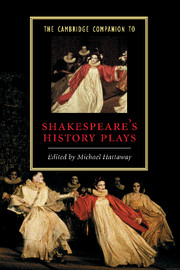Book contents
- Frontmatter
- PART 1 CONTEXTS
- PART 2 THE PLAYS
- 6 Plantagenets, Lancastrians, Yorkists, and Tudors: 1–3 Henry VI, Richard III, Edward III
- 7 Historical legacy and fiction: The poetical reinvention of King Richard III
- 8 King John: changing perspectives
- 9 Richard II: Shakespeare and the languages of the stage
- 10 Henry IV, Parts 1 and 2
- 11 Henry V: ‘the quick forge and working house of thought’
- 12 Shakespeare's ancient Rome: difference and identity
- 13 Shakespeare's other historical plays
- 14 Theatrical afterlives
- PART 3 REFERENCE MATERIAL
6 - Plantagenets, Lancastrians, Yorkists, and Tudors: 1–3 Henry VI, Richard III, Edward III
from PART 2 - THE PLAYS
Published online by Cambridge University Press: 28 May 2006
- Frontmatter
- PART 1 CONTEXTS
- PART 2 THE PLAYS
- 6 Plantagenets, Lancastrians, Yorkists, and Tudors: 1–3 Henry VI, Richard III, Edward III
- 7 Historical legacy and fiction: The poetical reinvention of King Richard III
- 8 King John: changing perspectives
- 9 Richard II: Shakespeare and the languages of the stage
- 10 Henry IV, Parts 1 and 2
- 11 Henry V: ‘the quick forge and working house of thought’
- 12 Shakespeare's ancient Rome: difference and identity
- 13 Shakespeare's other historical plays
- 14 Theatrical afterlives
- PART 3 REFERENCE MATERIAL
Summary
By transforming the chronicles of Tudor historians into drama, Shakespeare and his contemporaries brought English history onto the English stage. History and performance converged, attracting thousands of spectators. For the Elizabethans, history meant political history, particularly stories of kings and high officials, who were seen as embodying the health of the state. As William Baldwin put it in The Mirror for Magistrates (1559), 'where offices are duly ministered, it can not be chosen, but the people are good, whereof must needs follow a good common weal. For if the officers be good, the people cannot be ill. Thus the goodness or badness of any realm lieth in the goodness or badness of the rulers.'
The evaluation of rulers, however, was not the only goal of sixteenth-century historiographers. They wanted to know not only whether Henry VI had been a good or bad king, but also why. What were the causes of political success and failure, and what lessons could be drawn from English political history? In these concerns, Tudor historians resembled students of history today. Where they differed was in their interest, or lack of it, in accuracy. For example, Edward Hall (1548) and Raphael Holinshed (1587), the chroniclers most used by Shakespeare, gathered their narratives of medieval English history not from primary documents or eyewitness accounts, but from earlier chronicles and literary stories.
- Type
- Chapter
- Information
- The Cambridge Companion to Shakespeare's History Plays , pp. 89 - 105Publisher: Cambridge University PressPrint publication year: 2002



